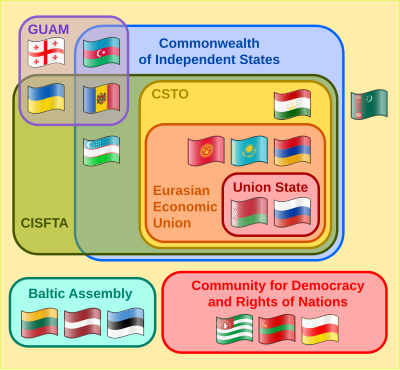Community for Democracy and Rights of Nations
This article needs to be updated. (March 2015) |
This article needs additional citations for verification. (March 2009) |

The Community for Democracy and Rights of Nations (Russian: Сообщество за демократию и права народов), also commonly known as Commonwealth of Unrecognized States,[1] rarely as CIS-2 (Содружество непризнанных государств, СНГ-2), is an international organisation uniting several states in the former Soviet Union, all of which have limited recognition from the international community.
History
An agreement on creating the commonwealth was reached by the four separatist states of Abkhazia, South Ossetia, Transnistria and Nagorno-Karabakh in 2001 at the foreign ministers meeting held in Stepanakert,[2] the capital of Nagorno-Karabakh. The Community for Democracy and Human Rights was established on 14 June 2006 in Sukhumi, Abkhazia by the presidents of three of these states: Sergei Bagapsh representing Abkhazia, Eduard Kokoity representing South Ossetia and Igor Smirnov representing Transnistria. Nagorno-Karabakh, which had been part of the 2001 agreement, left in 2004 but became a member in 2007. All four member states have limited international recognition: Abkhazia and South Ossetia are claimed by Georgia, Transnistria by Moldova and Nagorno-Karabakh by Azerbaijan.
On 17 June 2007, the four-state Community for Democracy and Peoples' Rights signed in Tiraspol—the capital of Transnistria—the joint Declaration on principles of peaceful and fair settlement of the Georgian–Abkhazian, Georgian–Ossetian, Azeri–Karabakh and Moldovan–Transnistrian conflicts. It calls for barring all types of pressure, such as military deployments, diplomatic isolation, economic blockades, or information wars, during negotiations toward resolution of conflicts. It also calls for external guarantees to eventual political settlements of these conflicts.
On 27 September 2009 the members of the Community for Democracy and Peoples' Rights agreed to abolish the visa regimes for their citizens. The agreement came into effect one month after its ratification by all three parliaments. It lasted for five years, after which it was automatically extended for another five-year term.[3] This agreement excludes Nagorno-Karabakh, who reserved the right to join this agreement at a later date.
See also
- GUAM Organization for Democracy and Economic Development
- Community of Democratic Choice
- Community of Democracies
- Unrepresented Nations and Peoples Organization
References
- ^ "Transnistrian Time-Slip" by Frank Jacobs, New York Times May 22, 2012
- ^ "Бум суверенитетов" – 2007-01-23, retrieved 2008-08-31
- ^ Южная Осетия, Абхазия и Приднестровье договорились упразднить между собой визовый режим (in Russian). Caucasian Knot. 2009-09-27. Retrieved 2009-10-03.
